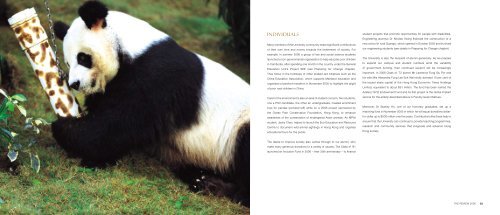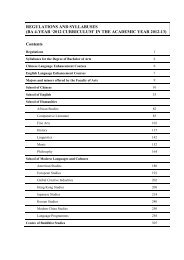2006 Review - The University of Hong Kong
2006 Review - The University of Hong Kong
2006 Review - The University of Hong Kong
Create successful ePaper yourself
Turn your PDF publications into a flip-book with our unique Google optimized e-Paper software.
<strong>The</strong>se experiences will be considered in the assessment process. <strong>The</strong><br />
Having increased the admission <strong>of</strong> international students, we are keen<br />
Beyond the curriculum, students organise many social, educational and<br />
<strong>The</strong> new curriculum will expose students to more challenges such as<br />
<strong>University</strong> will also continue to use English as the language <strong>of</strong> instruction,<br />
to strengthen opportunities for interaction with local students. A Global<br />
charitable activities through their societies and halls, and individually. <strong>The</strong><br />
how to study and socialise in a new country, how to apply classroom<br />
which is absolutely essential to maintaining an international campus and<br />
Lounge was opened in autumn 2005 to foster this interaction in a<br />
<strong>University</strong>’s General Education Unit also organises more than 40 courses<br />
knowledge in a community setting and even how to get by without<br />
attracting students from abroad.<br />
comfortable, internet-linked venue attractive to young people. In May<br />
each year to broaden student experience. In <strong>2006</strong> Project SEE (Students<br />
electricity (as the engineering students did in Guangxi). Our ultimate<br />
<strong>2006</strong> the Jockey Club Student Village II was <strong>of</strong>ficially opened with three<br />
for Equality and Equity) was launched to bring together our local and<br />
goal is that our graduates will possess not only the skills, experiences<br />
We are mindful <strong>of</strong> the need to engage the community in this process <strong>of</strong><br />
new residential halls which provided accommodation for 900 international<br />
international students and send them overseas to work on such issues<br />
and pr<strong>of</strong>essional knowledge traditionally required for success, but also<br />
change. Stakeholders in the pr<strong>of</strong>essions and business have been asked<br />
students. In the same month we also agreed with the <strong>University</strong> <strong>of</strong> British<br />
as women’s rights and AIDS relief. Several participating students were<br />
wisdom in how to apply them.<br />
to comment on the qualities they seek in graduates. Furthermore, the<br />
Columbia to build a hostel in the province where 100 places would be<br />
inspired to launch their own non-governmental organisation to benefit<br />
<strong>University</strong> has made significant contributions towards helping others adjust<br />
reserved for our students on exchange. <strong>The</strong> arrangements were made<br />
poor children in Cambodia (see also Endowing the Community chapter).<br />
to the new balance in higher education, including working with secondary<br />
possible by a generous donation from our honorary graduate Dr Simon<br />
schools in the move from a seven-year to six-year curriculum.<br />
K.Y. Lee.<br />
Internationalisation<br />
Educating the Whole Person<br />
An important area <strong>of</strong> change that graduates must be prepared for is<br />
Many effective learning experiences occur outside the confines <strong>of</strong> a<br />
globalisation. It is highly likely that during their working lives, they will<br />
either live abroad or be in regular contact with people from other cultures.<br />
classroom, through internships, student exchanges, community work<br />
and other practical exposure. <strong>The</strong> new four-year curriculum will increase<br />
Kate Jessop is a Year 3 exchange student from Canada.<br />
<strong>The</strong> <strong>University</strong> already <strong>of</strong>fers students numerous opportunities to gain<br />
international exposure and experiences and these will continue to<br />
increase with the four-year curriculum.<br />
Some 54 per cent <strong>of</strong> our academic and research staff originate from<br />
overseas. We also have an active exchange programme, sending 752<br />
<strong>of</strong> our students overseas in 2005-06 and hosting 525 students from 19<br />
the variety <strong>of</strong> these activities and give all our students an opportunity to<br />
learn through direct experience.<br />
A number <strong>of</strong> courses have embedded experiential learning into their<br />
curriculum. Students in the Centre <strong>of</strong> Urban Planning and Environmental<br />
Management, for instance, ventured into Central and Western District<br />
in 2005-06 to interview residents on sustainable planning and hold<br />
“I chose <strong>The</strong> <strong>University</strong> <strong>of</strong> <strong>Hong</strong> <strong>Kong</strong> because <strong>of</strong> its excellent reputation<br />
and the incredible city it is situated in. <strong>The</strong> staff have been very flexible and<br />
helpful, and I love the atmosphere on campus. <strong>The</strong>re is always something<br />
to do, whether it’s having a c<strong>of</strong>fee in the Global Lounge, attending a<br />
seminar or catching up on reading in the impressive and comfortable<br />
campus library.”<br />
countries. Exchanges are organised in several forms, some incorporated<br />
workshops, and their results formed the basis for a report to the local<br />
into a learning programme. For example, in <strong>2006</strong> the Faculty <strong>of</strong> Business<br />
District Council. Social Work students travelled to Tin Shui Wai to<br />
and Economics entered into a unique partnership with the London<br />
investigate the social problems that plague young people’s lives there.<br />
Business School that will require full-time MBA students to complete part<br />
Engineering students helped to design and oversee construction <strong>of</strong><br />
<strong>of</strong> their studies in London. A similar arrangement was also agreed with<br />
a school in a poor rural village in Guangxi, which opened in October<br />
Columbia Business School to commence in 2007.<br />
2005.<br />
16 <strong>The</strong> <strong>Review</strong> <strong>2006</strong><br />
<strong>The</strong> <strong>Review</strong> <strong>2006</strong> 17
















